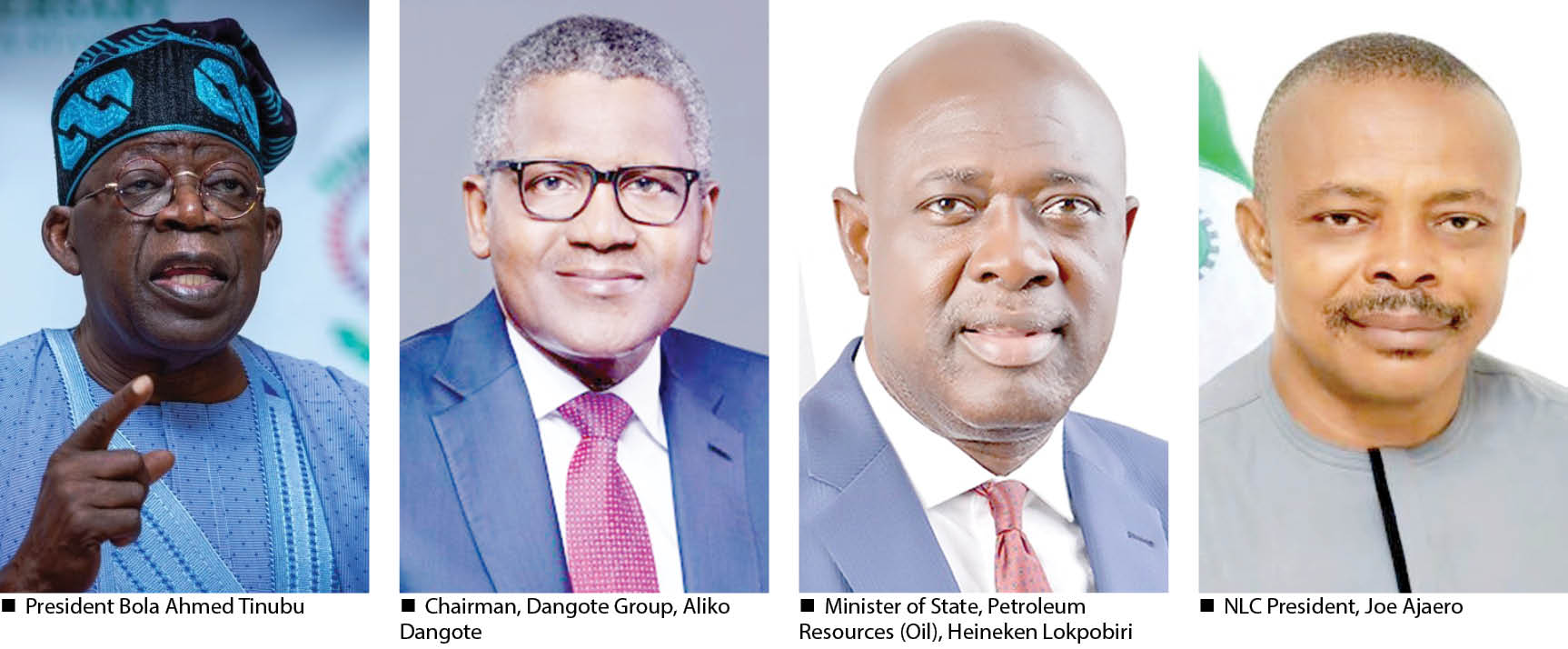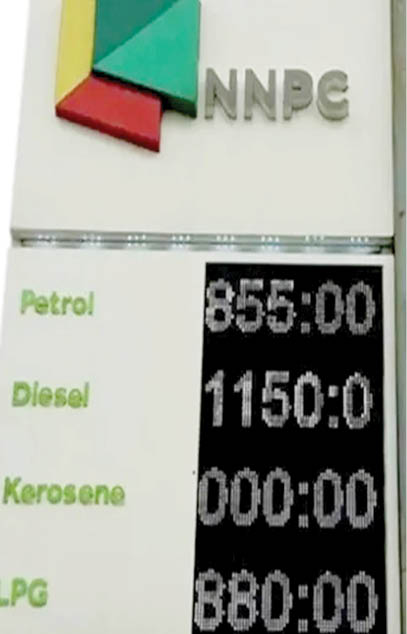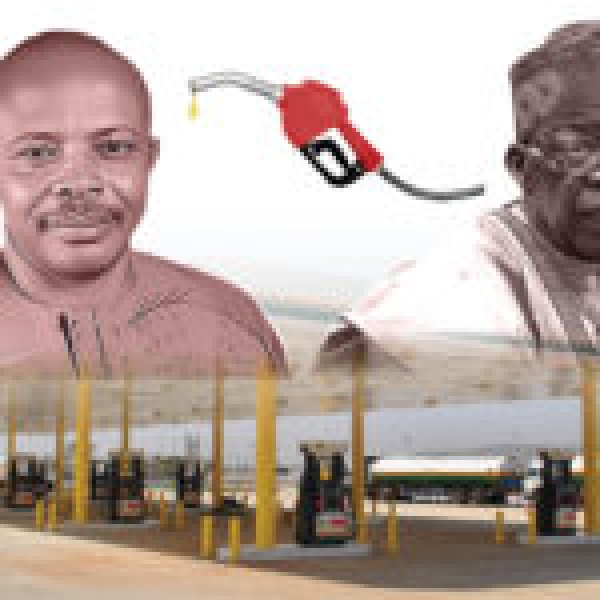As Nigerians lament the latest increase in the price of petrol, there is also an ongoing tango between the federal government and the Nigeria Labour Congress (NLC) over the turn of events, which has added to the hardship in the country.
The NLC, in an immediate reaction, asked the federal government to reverse the price to the N617 it was before the current hike, according to a statement by its president, Comrade Joe Ajaero. It also stated that the government’s recent action runs contrary to the agreement it reached with the union.
But this does not appear likely, as days after, the government is yet to reverse the hike in fuel price, just as it has failed to provide any explanation on the situation.
Twenty-four hours to when the Dangote Group indicated it was set to roll out products after years of wait, the price of Premium Motor Spirit (PMS) was adjusted upwards by the retailers, effectively putting pump prices at around N950 to as much as N1,400 in some parts of the country.
From that point onwards, the entire country was thrown into a cesspool of confusion as fuel queues, which have lasted over six weeks, worsened with many filling stations shut down.
With neither the NNPCL nor the regulatory agencies willing to offer Nigerians any meaningful explanation, prices have remained high amidst denial by the NNPCL that it had ordered an upward price review.
The NLC, which has always led the protests against arbitrary fuel price increases, further described the development as tantamount to an act of betrayal by the federal government.
It said this is because, during negotiations for wage increase, the government had agreed not to tamper with the price of petrol if Labour would come down on its demand.
The spokesman of the NLC, Mr Benson Upah, in an interview with Weekend Trust, explained that the NLC was betrayed by the current increase in the pump price of petroleum products because the president called for negotiations when their demand got stuck at N62,000.
“He made two offers which were to agree on the N250,000 we recommended while the price of PMS will rise to N1,500 to N2,000 or he will pay N62,000 and the status quo remains,” he said.

“At the end of that one week, the Presidency met again, and the Labour leaders, who are forthright, unambiguously said we would not accept the offer of N250,000.
“They rejected that and this was out of consideration for the well-being of the average Nigerian because we looked and said what would be the effect of this on the ordinary person.
“To keep this brief, the president acted in breach of his promise to Labour leaders and he knows the truth.”
Special Assistant to the President on Print Media, Abdulaziz Abdulaziz, however, countered Labour saying that was not the true representation of what transpired.
“I sat through the two meetings President Tinubu had with Labour leaders on minimum wage. At neither of the meetings was an offer made in exchange of fuel price hike. Ajaero is once again playing his dirty politics with the emotions of Nigerians,” he said.
NNPCL as sole buyer
The directive that only the NNPCL will be the sole buyer of the Dangote products when it begins to roll out refined products has not helped to calm the situation as it implies that independent marketers, with all their stations, would not be getting the products directly.
This has thrown up the issue of how much products would be sold to consumers in the end.
The Chairman of the Independent Marketers Association of Nigeria (IPMAN), Alhaji Abubakar Maigandi, said members of his association were surprised at the directive as there was no indication of that arrangement before the commencement of petrol production by Dangote Refinery.
But the two major deciders in the industry have been shifting blame while leaving Nigerians to bear the burden of the price increase.
With the consequent hike in the cost of education, transportation and food, many view the numerous responses as unhelpful. Checks by our correspondents revealed that people no longer drive their cars as they should as they are confronted by both by the price increase and non-availability of the commodity.
While initial reports indicate that the federal government is considering granting the Dangote refinery the authority to fix petrol prices, the issue has now been thrown to market forces to determine.
The Dangote Group has, however, expressed reservations about such thoughts.
A statement by the group explained that the company can neither influence nor set prices of petrol from its refinery, stating that only the federal government’s regulatory authorities could do so.
It also stated that NNPCL had not started lifting petrol from the Dangote refinery as the issue of pricing is yet to be concluded.
“The issue of fixing the price of petrol lifted from our refinery does not arise, as we are yet to finalise our contract with the NNPC.
“The PMS market is strictly regulated, which is known to all oil marketers and stakeholders in the sector, hence we cannot determine, fix, or influence the product price, which falls under the purview of relevant government authorities,” it stated.
The reaction from Dangote refinery has continued to generate divergent reactions among stakeholders in the oil and gas industry.
The Minister of State for Petroleum Resources (Oil), Heineken Lokpobiri said: “What is important is for us to convey to Nigerians that the president is empathetic about what is going on in the country.
“What is important is that products are available in the country, and we believe that between now and the weekend, there will be availability of products across the length and breadth of the country.
“The price could be high in some other areas, much higher in some other locations, and in some locations, much more than you know in other areas.”

According to experts, the issue around pricing shouldn’t be difficult to address in order to stabilise the industry and restore confidence in the system. They also noted that plans by the government to continue the subsidy regime are responsible for the confusion.
An industry expert who spoke with our correspondent in confidence said, “What is happening is like a game plan, and we are waiting to see the end of the script being acted on.
“It is not just a coincidence that the day Dangote rolled out its product was when the NNPC adjusted the pump price, and I can tell you it is to prepare the people for the new price of PMS even from the stable of Dangote refinery.”
The debate has continued unabated both online and offline and it is generating anxiety in the industry as Nigerians continue to experience scarcity of the product and spend hours at petrol stations.
Another industry expert and analyst, Adetunji A. Oyebanji, confirmed this development while speaking with our correspondent.
He said, “There is so much confusion. All these are supposed to be normal contractual relationships that are dealt with privately. Now, everyone is issuing press statements.
“It should not be so. The ideal situation is a free and competitive market with many buyers and sellers. The role of the regulator should be that of a mediator, moderator, arbiter and enforcer.”
Another oil industry player and chief executive officer of CITA, Dr Thomas Ogungbangbe, stated that the rollout of petroleum products from Dangote refinery would not bring about any price reduction but product availability.
He called for full deregulation of the industry in a way that would bring in more players which would deepen competition and ultimately price reduction.
He said, “Dangote will only ensure availability, it does not translate to any magical price reduction because the refinery is a for-profit-venture and it is also logging to the protocols of other refineries in the world.
The NNPCL has confirmed that it will start lifting product from the Dangote refinery on September 15, but outlined factors that would determine its price.
It said foreign exchange rates and market forces would influence the cost of petrol, stressing that the market had been deregulated.
NNPCL said foreign exchange illiquidity had been a significant factor influencing the fluctuation in prices of petrol, which are governed by unrestricted free market forces, as provided for in the Petroleum Industry Act.
The Executive Vice President, Downstream, NNPCL, Adedapo Segun, said on Thursday during a live television programme that the current fuel scarcity was expected to “subside in a few days as more stations recalibrate and begin selling PMS.”
With each side approaching the issue from different perspectives, it is still not clear if the burden occasioned by the price increase will be remedied soon.
[DailyTrust]


